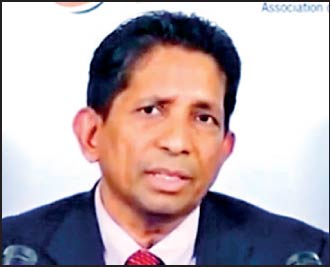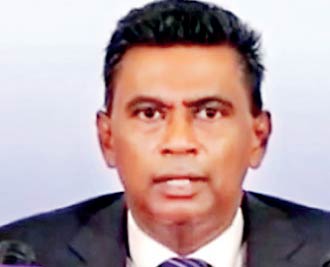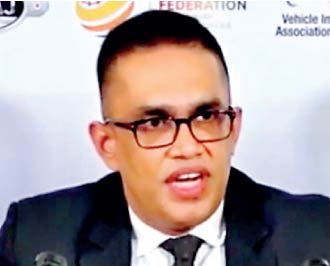Wednesday Feb 25, 2026
Wednesday Feb 25, 2026
Monday, 6 January 2025 04:41 - - {{hitsCtrl.values.hits}}
By Charumini de Silva
 |
| SLBCJ President Jagath Ramanayake |
 |
| VIAL Chairman Indika Sampath Merenchige |
 |
| VIASL President Prasad Manage |
The key stakeholders in the vehicle industry expressed cautious optimism on the decision to lift the country’s five-year ban on imports next month, whilst highlighting challenges and opportunities.
Convening a media briefing recently, the Automobile Exporters and Importers Joint Committee, comprising representation from major industry groups, including the Sri Lanka Business Council of Japan (SLBCJ), Sri Lanka Automobile Association in Japan (SLAAJ), Global Federation of Sri Lankan Business Councils (GFSLBC), Vehicle Importers’ Association of Lanka (VIAL), and Vehicle Importers of Sri Lanka (VIASL), has garnered a mixed response from industry champions.
They opined the move, expected to boost tax revenues and employment, must be managed carefully to avoid strain on the country’s fragile foreign reserves.
The decision, announced by President Anura Kumara Dissanayake in December 2024, follows the Government’s structured program to reopen the market in stages, beginning with essential transport vehicles.
They also cautioned that the suspension of vehicle imports and the cancellation of existing letters of credit (LCs) may create a challenging situation when resuming vehicle imports, particularly from Japan.
Addressing the media, SLBCJ President Jagath Ramanayake highlighted uncertainties regarding Japanese banks’ willingness to process letters of credit (LCs), a key financing mechanism for vehicle imports.
“As per the international law, once an LC is opened it cannot be cancelled – it allows you to ship your goods without any restrictions. However, amidst Sri Lanka’s economic crisis, the Government suspended LCs across the entire banking system in Japan. This has left a big stigma among the banking system in Japan. Although we did not feel it much as the market was closed for a long time, we are still not clear how the Japanese banks would respond to opening new LCs from 1 February,” he explained.
Ramanayake said the Council has informed the Japanese authorities on the economic progress Sri Lanka has made with the International Monetary Fund (IMF). “We remain hopeful of getting a favourable response from Japanese banks by next month,” he said.
Ramanayake also noted that despite market optimism, a large volume of vehicle imports remains unlikely in the near term.
VIAL Chairman Indika Sampath Merenchige asserted the significant revenue potential of vehicle imports for the Government.
“The Government has allocated around Rs. 1-1.2 billion, but I can assure you that this amount will be halved as expats will keep sending money to import vehicles,” he added.
Merenchige described vehicle imports as one of the best avenues for enhancing tax revenue and stimulating economic activity.
VIASL President Prasad Manage opined the reopening of the market will generate remarkable employment opportunities, both directly and indirectly.
He projected that the move could create at least 2-3 million jobs.
However, he cautioned that any mistakes in the process could lead to another market closure.
“We don’t want any missteps in the process that could cause the market to close down again,” he stressed.
The ban, introduced in March 2020 to mitigate foreign exchange outflows during the country’s economic crisis, has left the automobile industry stagnant for years.
Manage also warned of potential pitfalls in the reopening process amid the urge to make advance payments. “There is no need to panic and rush to make down payments for vehicles,” he said, citing price uncertainty and clarity on the process.
Some of the representatives opined that vehicles are available from Rs. 2.5 million onwards, whilst noting that they are unable to determine values and levies. They also highlighted the illegal imports made and assembly of vehicles during the previous regime.
Under the Government’s phased approach, imports of passenger transport buses and specialised service vehicles resumed on 14 December 2024. The next phase will allow goods transportation and private vehicles starting February 2025.
The reopening aligns with the country’s Extended Fund Facility (EFF) agreement with the IMF, which supports economic recovery reform measures.
In November last year, IMF Senior Mission Chief for Sri Lanka Peter Breuer welcomed the decision, stating that vehicle imports could boost State revenue, whilst insisting on the importance of prudently managing the process to prevent undue pressure on foreign reserves.
Sri Lanka’s gross official reserves improved to $ 6.5 billion at end November 2024, compared to $ 4.4 billion at end December 2023.
Speaking in Parliament on 17 December 2024, President Dissanayake assured the public that the move would not trigger a foreign exchange crisis, emphasising the necessity of reopening vehicle imports.
“The vehicle industry cannot remain closed indefinitely,” he said, reiterating that the imports would be monitored to ensure economic stability.